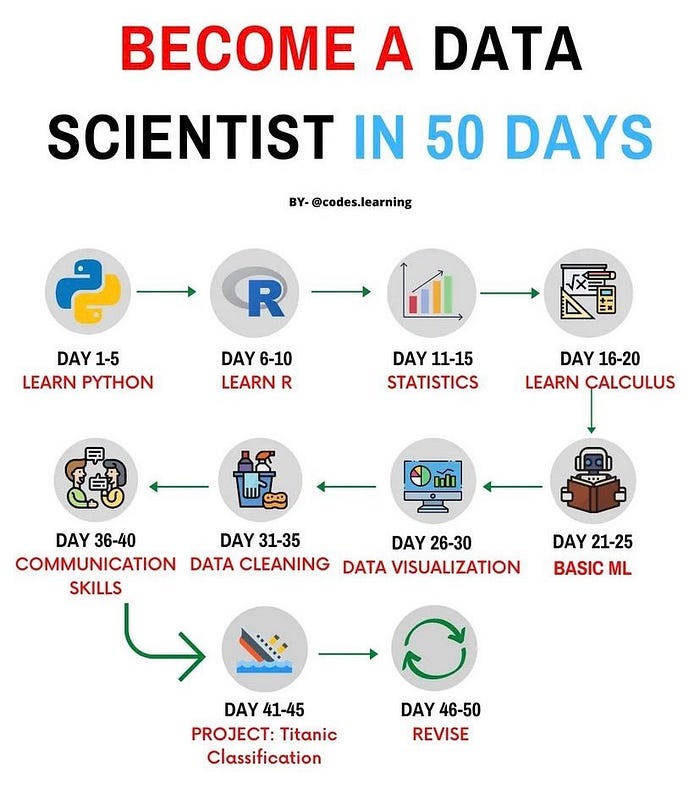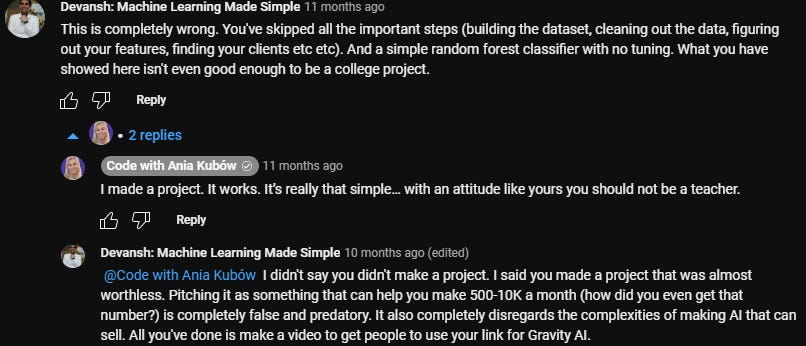How influencers are stealing from you[Finance Fridays]
All these influencers are selling false promises to make money.
Hey, it’s your favorite cult leader here 🐱👤
On Fridays, you get posts about money 💲💰💰💲. Expect a mix of posts on personal finance, breakdowns of the most relevant events in the Tech Industry, and insights into the unique workings of the tech industry. 🔍🔍. Use these posts to master the money game, and solidify your finances to ride out the meanest of recessions.
If you can, please consider buying and rating my 1 Dollar Ebook on Amazon. To get access to all the articles, support my crippling chocolate milk addiction, and become a premium member of this cult, use the button below-
p.s. you can learn more about the paid plan here.
A while ago, I came across this YouTube video, titled, BUILD and SELL your own A.I Model! $500 — $10,000/month (super simple!). It was created by the popular coding YouTuber, Code with Ania Kubów. As somebody who has worked in AI (and actually sold an AI algorithm for detecting Parkinson’s Disease), I was curious about what Ania had to say. Unfortunately, that video was completely misleading, to the point of lying to the audience. It trivializes the Machine Learning process and is clearly designed as a way to get people to sign up for Gravity AI, not to provide value to the viewer.
This is a trend that is becoming more common in Machine Learning. ChaGPT has created a lot of attention around AI and Machine Learning (as I’m writing this, the term LLM is trending on Twitter. For those not in the know- LLM stands for Large Language Models like ChatGPT, GPT 4, and more). Lots of education channels/influencers pretend that it is easy to make lots of money with Machine Learning or Data Science. Just buy their course/use their product, and you will roll in the money. And with the rollout of GPT-4, this is only going to get much worse.
Well, this article is going to burst your bubble. You will not become a good Data Scientist or Machine Learning Engineer after watching a course/signing up for a product. You will certainly not make any real money doing SUPER SIMPLE! solutions. This article will break down why so that you don’t waste your time (or your money) on these scammers.
Key Highlights
Why this matters- I’ve covered a lot of scams and fraud on this newsletter. Of them all, this is the one that a lot of you are most likely to fall to. A good portion of my readership (about 40%) is college students, junior engineers, or people trying to transition into Tech. These courses/products prey upon such people. Chances are one of you, or someone you know has paid for such overpriced nonsense.
Understanding these scams- The big red flag that these scams all have a basic claim- you get outsized returns for very little investment. This is never the case. Nothing that promises you great returns without any investment is worthwhile. A good book or course will teach you principles but will require work on your end. Or enough upfront capital to handle serious leverage. If a course or program states that you don’t need money, time effort, or special skill to get wealthy- run.
Why Good Courses can’t make you an expert- Good courses will teach you something specific (learn the basics of Deep Learning with PyTorch). Scam courses (like the ones that will make you a Data Scientist in 50 days) will make sweeping promises. Expertise (on even a baseline of insight) can’t be taught through a course because it is developed through practice and experience with problems. A course created for usage by many people will be by its nature general. Thus, it can’t teach you how to deal with the nuances of a specific challenge/circumstance. And as the saying goes, the devil is in the details.
Why Super Simple methods don’t work- Think basic demand and supply. Large Supply—> Low prices. If there is a super simple method that works, there will be a lot of people that jump on to do it. This means that there will be a lot of supply of that particular method, severely cutting down costs. If something is simple and works well, why would more people not do it? And if more people are doing it, how would you make money to stand out from the crowd? These are questions to ask when such a course is pitched to you.
Time to highlight these points in more detail. If you’re interested in learning more, keep reading on.
Why I’m writing this
Here is a conversation I had with a premium subscriber in this newsletter- Rose (name changed). Rose is a student in college, who has yet to get work in her first job. She wants to make it in tech/software development for job prospects. However, she has no networks in the field, and her only exposure to tech is through college classes and online content creators. When I asked her about her reasons for subscribing and goals, this was her message to me-
People like her are the most likely to fall for this marketing. Why? There are a few things about Rose that make her ideal-
Rose knows there is money to be made in tech. She has seen the videos and read the articles on how much Big Tech peeps make. Thus she is less likely to be skeptical of the promises being made.
Rose doesn’t have direct experience in the field. If Ania tried to sell her video to Yann LeCun, he would laugh in her face. Rose has no way of verifying Ania’s advice. Keep in mind, that these influencers often have giant platforms and tons of people who will uncritically accept what the influencer puts out. Social proof can be a powerful deterrent.
Rose has a strong motivation to want to make it ASAP. Most people would want to make 500–10k USD monthly following SUPER SIMPLE methods for personal spending. Rose has all that, added to her incentive to take care of her family.
I’ve covered many scams in the past. In my post on SBF, and the circumstances that enabled him to scam millions of people, I covered how frauds like him use Social Media, Clout, and people’s ignorance about complex topics to fool ordinary people like Rose, you, or me. These scams do something similar- they target gullible people through social media campaigns, and lure them with false promises and fake engagement to try out their courses and products. The results are ugly…

Looking at the comments section of Ania’s video, there are plenty of people who trust Ania and will go ahead and sign up for Gravity. Some of them will, unfortunately, commit a lot of time, energy, and money to this venture, in hopes to hit this amazing monthly goal. Maybe another person will buy one of these Data Science in 50 days courses and waste their time and money on something worthless. Hopefully, this article will help you think twice and not fall for such schemes.
Anatomy of SUPER SIMPLE! scams
All such scams have something in common. They claim to provide you with outsized returns, for very little input. Building an ML model that sells for any amount of money is a lot of work.
Even if you did build a Model that can sell, most ML models are specific to clients. Clients from the same industry, trying to tackle the exact same problem, will have very different data sets. Thus, we would require different models (or at least retraining). Not to mention, data-drift, new features, and other nightmarish scenarios.
Ania’s video conveniently ignores all of these nuances. She makes it seem like you build a 2-minute model (with Data that magically appears) and you will end up with a ton of people wanting to buy your model. Look at another comment on the same video, to which she conveniently never replied.
The Data Scientist in 50 Days courses follow a similar pattern. Getting into Machine Learning/Data Science/Deep Learning requires a lot of background knowledge in a variety of fields. Knowing how to build a Neural Network in Keras or copying HuggingFace models doesn’t make you good at ML. Knowing when to do what does. As boring as that sounds, you get this through experience and constant learning. No matter how much of a prodigy you are, 50 Days will not give you the understanding of the nuance required to become good at ML.
I’ve been involved in ML since late 2017 now. But I still come across new ideas, use cases, and concepts regularly. The most recent Breakdown on my AI-focused newsletter is a good example. In it, I cover the architectural flaws with ChatGPT (and other generative AI) that causes it to lie and make up information. Even after months of research into the topic, I had to acknowledge that some of my statements were conjecture and that there was a hard limit on what I knew about the topic-
Unlike the other two reasons discussed, this could possibly be changed. By increasing the lookback/window that the probability generation considers, we might be able to reduce the error increase after every generation to a manageable level. However, this would also likely require much more training and validation, making it infeasible to develop. I’m basing this bit of my own experiences and conversations with others. However, keep in mind I’m not a text expert, and could be off here. If you have any insights into how we can accomplish better generations, I’d love to hear them.
-A passage from the breakdown
Even after all these years, I still have to regularly ask for input/insights because there is so much about the field that I have no experience with. It is unreasonable to assume that you will be a Data Scientist/MLE in 50 days, with no prior skills. New papers are published, ideas are tested, and implementations are created every other week. The field evolves rapidly, and flimsy training with no prereqs will leave you very underprepared. You will constantly need courses and paid mentorship since you will never develop the foundations to learn on your own.

I’m not saying courses are useless. I often recommend them in my content. However, good courses will teach you something specific. They come with prereqs, specific goals, next steps, etc. A far cry from the scams that are becoming more common in ML Education.
To give you a good example of a course that teaches you something valuable, I want to give you the example of the Introduction to Deep Learning Course by the AI Extraordinaire- Sebastian Raschka, author of the amazing Ahead of AI newsletter. Despite how comprehensive it is, the course itself is fairly limited in what it teaches you. It focuses on a particular framework and a few core ideas. It doesn't promise to make you an expert, because it won't teach you how to build your own dataset, select the best samples, implement other training protocols, etc. This is a good thing. It limits focus, and thus allows the course to really deliver on what it promises. Contrast this with the learn data science in 50 days/GPT/Stock Mastery Courses. They claim that will allow you to master complex skills in no time and with low effort, without any background knowledge.
To hammer this point home one more time, let’s now look at the economics of SUPER SIMPLE methods, and why they can’t make money in the long term.
Why SUPER SIMPLE! methods won’t make you money
To end, I will go over a simple (almost SUPER SIMPLE!) argument about why these scams will just be a waste of your time and resources. It relies on a foundational idea in economics -demand and supply.
Let’s say for the sake of argument, that what Ania was saying was accurate. You can make SOME money by selling simple AI models that don’t require any kind of training for specific datasets. We saw how easy it was for Ania. What is to stop me, and the rest of her viewers to do what she did? Her video has over 1 Million viewers with 360K likes. That is a lot of potential competition. This leads to 2 possible situations-
People enter a very niche market with their models. Something with almost no competition (Peter Thiel would be proud). However, this also severely restricts your market. By definition your customer base is small, and unless you can secure a high-ticket client, you won’t get numbers. And why would a high-ticket client be trying to buy models on Gravity?
You enter a crowded market and hope to peel a market share. To make money, you either have to be better than everyone else (not SUPER SIMPLE!) or be very cheap.
The same goes for any skills that you can learn quickly. If you can learn something quickly, with no prereqs, then what stops everyone else from learning it? If what you’re learning is valuable, then why would others not want to learn these skills? Next time you’re offered a course that will change your career quickly, step back. If anybody can do it, think about our discussion earlier. How would you sustainably make money with it? Hold off the competition? And why would someone pay for this skill, when they can easily learn and implement it themselves? Some questions to think about as scams get pitched to you.
That is it for this piece. I appreciate your time. As always, if you’re interested in reaching out to me or checking out my other work, links will be at the end of this email/post. If you like my writing, I would really appreciate an anonymous testimonial. You can drop it here. And if you found value in this write-up, I would appreciate you sharing it with more people.
Upgrade your tech career with a premium subscription ‘Tech Made Simple’! Stay ahead of the curve in AI, software engineering, and tech industry with expert insights, tips, and resources. 20% off for new subscribers by clicking this link. Subscribe now and simplify your tech journey!
Using this discount will drop the prices-
800 INR (10 USD) → 533 INR (8 USD) per Month
8000 INR (100 USD) → 6400INR (80 USD) per year
Reach out to me
Use the links below to check out my other content, learn more about tutoring, reach out to me about projects, or just to say hi.
If you like my writing, I would really appreciate an anonymous testimonial. You can drop it here.
To help me understand you fill out this survey (anonymous)
Small Snippets about Tech, AI and Machine Learning over here
Check out my other articles on Medium. : https://rb.gy/zn1aiu
My YouTube: https://rb.gy/88iwdd
Reach out to me on LinkedIn. Let’s connect: https://rb.gy/m5ok2y
My Instagram: https://rb.gy/gmvuy9
My Twitter: https://twitter.com/Machine01776819











Pretty good! That bit by Warren Buffett at the end reminds me of something another investor in real estate said, Sam Zell, about how he prefers businesses with high barriers to entry.
Great read. And again most of these YouTubers and content creator are also looking to make money, so they sell anything to make that possible